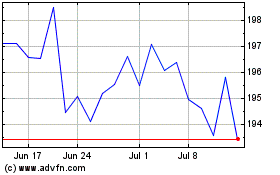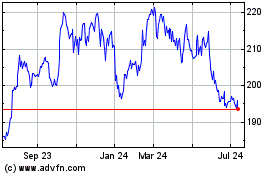UPDATE: CME Sets Timetable For Diesel Futures To Replace Heating Oil
July 27 2011 - 3:31PM
Dow Jones News
The world's inaugural energy futures contract, for heating oil
delivered to New York Harbor, will be discontinued after April
2013, replaced on the New York Mercantile Exchange by a contract
for ultra-low sulfur diesel fuel in response to changing
environmental laws, CME Group (CME) said Wednesday.
The demise of the heating oil contract, which began trading in
1978, had long been heralded, but CME set the precise timing with
the announcement.
Heating oil futures currently are listed for trading through
January 2013. CME said that effective Aug. 22 three additional
months will be listed, allowing the contract to trade through the
end of winter before going off the board for good with the April
2013 contract settlement at the end of March.
Also on Aug. 22, the New York Harbor ultra-low sulfur diesel
futures contract, currently listed through January 2013, will be
listed for trade more than five years forward. That contract was
first listed in 2007, but hasn't seen any trading activity
recently. Nymex officials said they expect volume to pick up as the
day draws near for the discontinuation of the heating oil
contract.
CME said the move is related to regulatory changes to lower
sulfur heating oil in New York state, basically making the product
identical to ultra-low sulfur diesel fuel, used in trucks.
In July 2010, New York approved a switch to a sulfur content of
no more than 15 parts per million in 2012, which is four years
earlier than New Jersey's planned move to that level in July
2016.
The federal Environmental Protection Agency sets sulfur levels
for diesel fuel, but states regulate heating oil, which is largely
consumed in the Northeast U.S. In New Jersey, for example,
home-heating oil currently can contain 2,000 ppm or more of
sulfur.
Daniel Brusstar, CME group director for energy research and
product development, said the timing set by New York state, which
is the biggest consumer of heating oil in the nation, pushed the
exchange to make the move in early 2013. The heating oil market,
largely limited to the Northeast, is shrinking, while demand for
ultra-low sulfur diesel fuel is growing, he said.
"The ULSD standard will be much more useable on a nationwide
basis" and will be in line with global benchmarks, he said.
Ultra-low sulfur diesel stocks' share of distillate fuel
inventories are growing nationwide. The fuel made up 69% of
nationwide distillate stocks and 44% of East Coast distillate
inventories on July 22, data from the Energy Information
Administration show.
-By David Bird, Dow Jones Newswires, 1-212-416-2141
CME (NASDAQ:CME)
Historical Stock Chart
From Jun 2024 to Jul 2024

CME (NASDAQ:CME)
Historical Stock Chart
From Jul 2023 to Jul 2024
